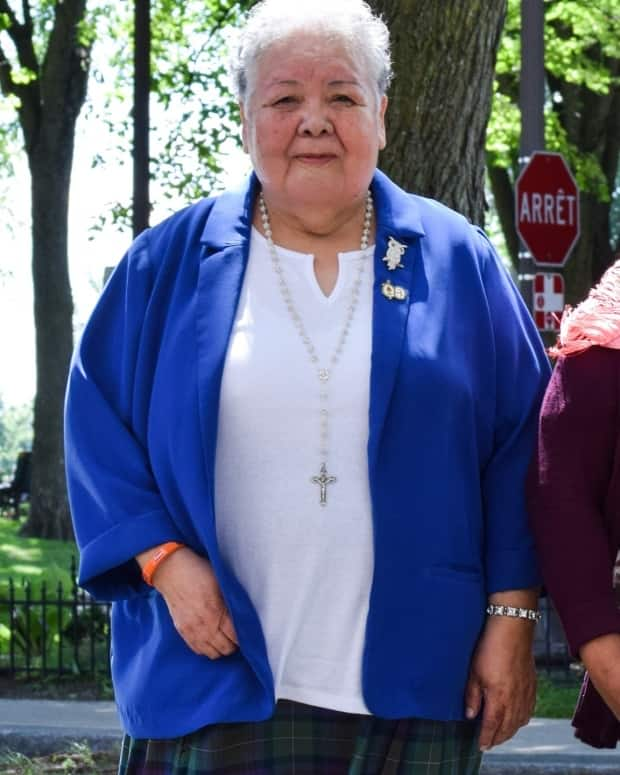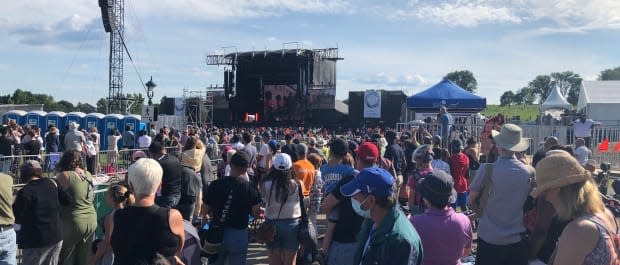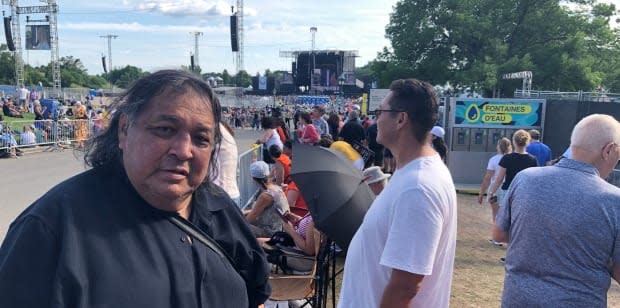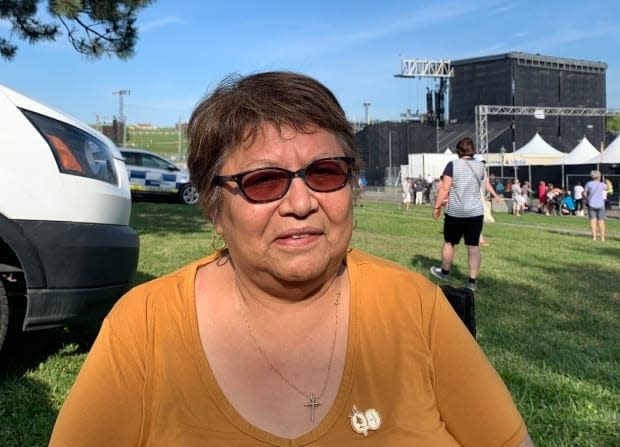'To remember those who have already gone': Quebec Cree prepare for Pope visit

Cree survivors from northern Quebec choose different ways to engage — or not — with Papal visit.
Some Cree survivors have made the trip to Quebec City to be among hundreds of people gathered to hear the pope's address late Wednesday on the Plains of Abraham.
Some, like Clara Napash from Chisasibi, are part of the official Cree delegation meeting with Pope Francis at the Citadel in Quebec city.
"I'm doing this to remember those who have already gone home to the spirit world, also, those who never made it home. I am grateful to be here in person on behalf of all survivors," said Napash on the Grand Council of Crees Facebook page.
Clara Napash was first sent to residential school on Fort George Island, near present day Chisasibi at the age of two. Fort George was the site of the first two residential schools in Quebec; St. Philip's, which operated from 1933-1975 and the Fort George Roman Catholic Residential School (also known as Ste-Thérèse-de-l'Enfant-Jésus), which operated from 1937 to 1981.
Meeting with the Pope

Youth delegate Allison MacLeod from Mistissini joined Clara Napash as guests of Cree Grand Chief Mandy Gull-Masty, who also met with Pope Francis Wednesday at the Citadelle, a fortress overlooking the Plains of Abraham and the St. Lawrence River, bordering the old city.
Governor General Mary Simon and Prime Minister Justin Trudeau also greeted the Pope at the Citadelle and before heading inside for private meetings.
Wednesday evening Pope Francis also delivered a public address from the Citadelle which was broadcast on large screens on the plains.
He was also expected to tour the Plains of Abraham, along George VI Avenue East, before heading toward the Archdiocese of Quebec, not far from the Château Frontenac hotel.
The events in Quebec city were delayed Wednesday to allow Indigenous leaders and guests on a delayed charter flight from Edmonton to attend the ceremony.
Survivors travelled from some Cree communities

A busload of survivors from Cree Nation of Mistissini made the trip to Quebec City to hear Pope Francis' address. Other survivors also made the trip from other Cree communities such as Oujé-Bougoumou, Waswanipi and Waskaganish.
"I said, why not?" said Waskaganish survivor Charles Esau. "I think I'm coming to a full circle of knowledge about the whole effects of trauma … the root causes."
Esau also said it was important for him to be "a helper" and attend to support all of the residential school survivors.
He's doing something that other Popes haven't done in the last 500 years. - Charles Esau, Waskaganish survivor
He said a lot of people are critical of the Pope's visit to Canada, but Esau feels that some good can come from it.
"He's a spokesman for one of the biggest organizations in the world. He's also a human being. He's doing something that other Popes haven't done in the last 500 years.

"My expectation is not that the whole world will change, but at least the world will understand and will educate themselves about the root causes of trauma," said Esau, adding that understanding will also help Indigenous communities better understand lateral violence and the harmful impacts of residential school.
Esau also called on the Pope to renounce the Doctrine of Discovery and the harms it's caused.
The Doctrine of Discovery were edicts issued by the Catholic Church in the 15th century in the form of papal bulls to empower Portugal and Spain to colonize, plunder and enslave West Africa and the Americas.
The Doctrine of Discovery is something the pope has yet to mention publicly so far on his week-long trip to Canada.

Chisasibi chose to hold healing gathering at home
The Cree community of Chisasibi chose to not send an official delegation to Quebec, deciding instead to hold its local healing Residential School Gathering.
"[This] is a decision rooted in compassion, respect, and love for survivors, former students, elders and intergenerational survivors of Chisasibi," said Chief Daisy House, in a news release.
"This week, we will focus on our strength and collective healing at the Annual Fort George Residential School Gathering."
In June the community also announced that it will move forward a ground penetrating radar search of former residential school sites on Fort George Island.
"For more than a year, we have had very difficult conversations about a ground search at these sites. Chisasibi Eeyouch [people] are feeling raw, challenging emotions already, and [the Pope's visit] this week will trigger more pain in the coming days," said House, She said she was comforted to know that survivors would be in their community surrounded by family.
"Our hope is for survivors and former students to be in a safe place during this Papal visit, surrounded by family and loved ones, in the comfort of their community," said Chief House.
Pope Francis will deliver a mass Thursday at 10 a.m. at the Sainte-Anne-de-Beaupré Basilica, about 30 kilometres northeast of Quebec City. He will be in Quebec until Friday before heading to Iqaluit.

